gba1 [g͡bá] adv. indicates that the ac-
tion in the main vb. was performed
collectively: Iran gba rrievbare ―
“They ate together”.

gba [g͡bà] vb. to tie; to bind: ya
irri gbae ― “Use a rope to tie it:
Tie it with a rope”.

gba3 [g͡bá] vb. 1. to be complete; to
be accurate; 2. to assemble; to gather
(of people): Ẹvbo gba ye evba ―
“People are gathered there.” Ígho
nii gbae ― “That amount is accurate.”

gbakhẹẹ [g͡bàxɛ̀ɛ́] vb. to waylay; to
lie in wait for.

gbaa [g͡bàá] vb. to know somebody
thoroughly, (especially his/her weak-
nesses or failures): Iran hia gbaa ruẹ
nẹ ― “They all know all your weak-
nesses already.”

gbaan [g͡bã̀ã́] vb. to shift; to cause to
%%

move or fall by brushing against:
Ọ ya ukoko-obọ gbaan mwẹn emiowo
fua vbe obọ ― “He used his elbow
to knock down my meat from my
hand”.

gbadaa [gbádáá] adj.; adv. (with ye)
wide and expansive (e.g. field; lake).
(also gbalaa; gbalazaa, gbodoo).

gbae [g͡báè] vb. to be big; to be
full-sized (also digba).

gbaẹngbe [g͡bã̀ɛ̃gbé] vb. (< gbaẹn-
egbe): “to shift body”: to move out
of the way for something/someone;
to shift one’s position; to avoid.

gbaghada [g͡bàɣàdà] adv. describes a
manner of falling: like the fall of
something with branches or extensions
(e.g. a person falling from a height
with the limbs spread out).

gbaigbai1 [g͡bàig͡bài] adv. with the
$Page 053$

verb yunnu: to open and close re-
peatedly; to gasp: ọ ghi yunnu gbaigbai
vbene ọ khian wu ― “He is now
gasping like someone about to die.”

gbaigbai2 [g͡bàig͡bài] adv. describes a
manner of walking: with confident
strides: ọ gha ze owe gbaigbai: “He
is striding confidently”.

gbakiyẹyẹ [g͡bákíyɛ̀yɛ́] vb. (< gbe-
akiyẹyẹ) “to make a joke”, to make
a fool of; to make a joke of: Iran gha
yae gbakiyẹyẹ ― “They are making
a fool of him”.

gbakpan1 [g͡bákpã́] vb. (< gbe-akpan)
to be bald.

gbakpan2 [g͡bák͡pã́] vb. (< gbe-akpan):
“to cause obstruction with foot”:
1. to obstruct or intercept someone
walking along by causing him/her
to stumble over his/her foot: Ọ
gbakpan yọ mwẹn owẹ, i na de ―
“He caused me to stumble, and I fell”:
to cause to falter in one’s walk: Ukpọn
ne ọ rhuaẹn gbakpan ye ọre owẹ
“The cloth she had wrapped around
her caused her to falter in her walk.”
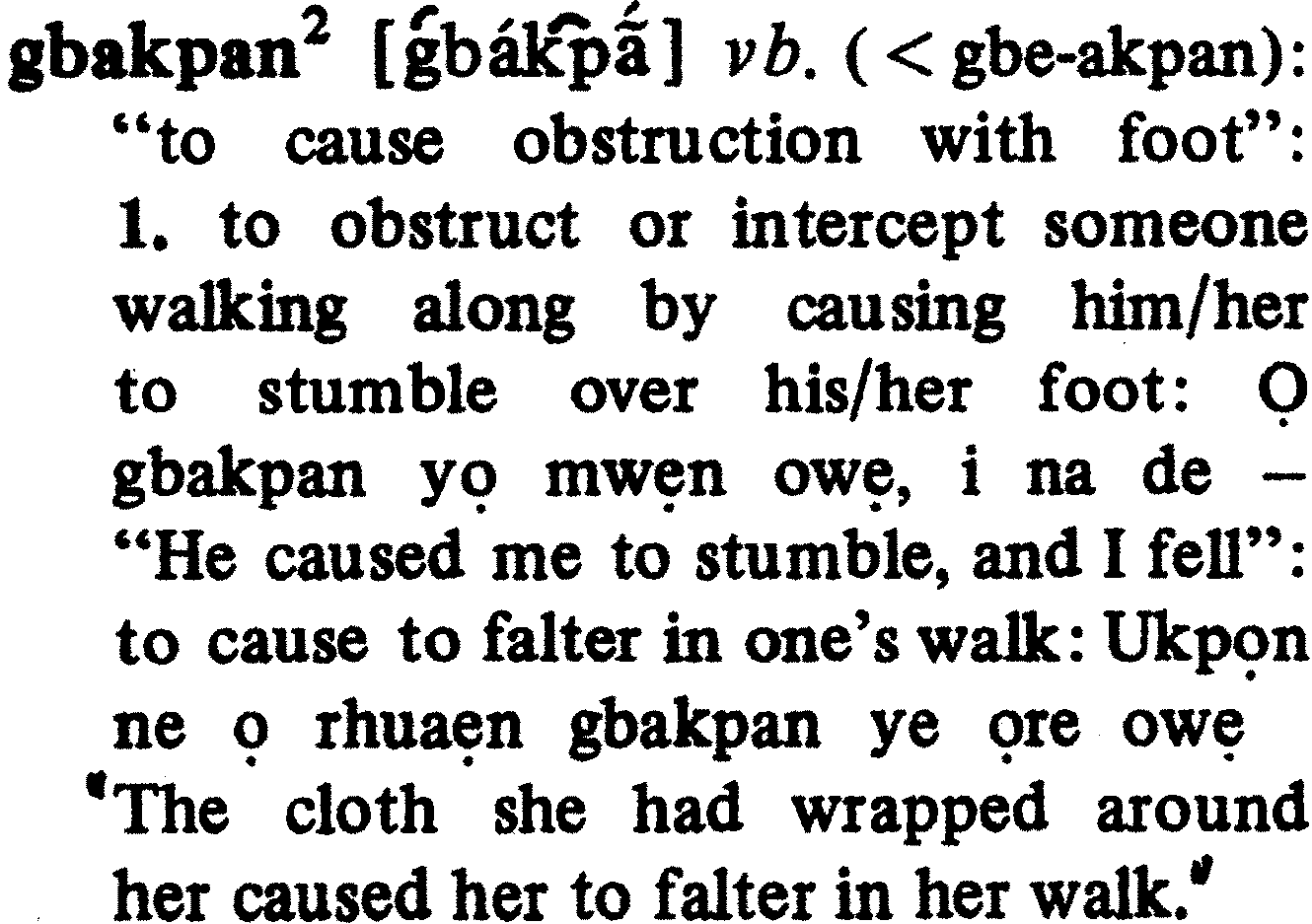
gbalama [g͡bálàmà] vb. (< gbe ―
alama) to be meddlesome; to under-
take responsibilities that normally
belong to others.

gbalaza [g͡bálázá] adj.; adv. cf. gbadaa.

gbaleto [g͡bàlètó] vb. (< gbalọ ― eto)
“to wrap hair”: to wear a head-scarf.

gbalọ [g͡bàlɔ́] vb. 1. to wrap; 2. pl.
or iter. sense of gba: to tie several
objects; or to tie a rope round and
round several times.

gbangbanangban [g͡bã́g͡bã́ã́g͡bã́] adj.;
adv. 1. (introduced by the verb
ye): strong; tight; 2. (used with
%%

other verbs): tightly; firmly: Ọ ya
ise kan iran kugbe gbangbanangban
― “He nailed them together firmly.”

gbangbanangban [g͡bã̀g͡bã̀ã̀gbã̀] adj.;
adv. erect; stiff; rigid.: ọ mudia
gbangbanangban: “It stood erect.”

gbankangbankan [g͡bã̀kã̀g͡bã̀kã̀] adj.;
adv. describes shape: big and thick
(of several objects).

gbannọ [g͡bã̀nɔ̃́] vb. 1. to clear; to
brighten up; (e.g. of cloudy weather):
Iso hia gbannọ nẹ ― “The entire sky
has cleared. (i.e. it won’t rain any
longer)”^; 2. (of sickness) to improve:
Oni ne ọ gbẹe fẹko gbannọ nẹ ― “The
fever that had afflicted him is now
gradually improving.”
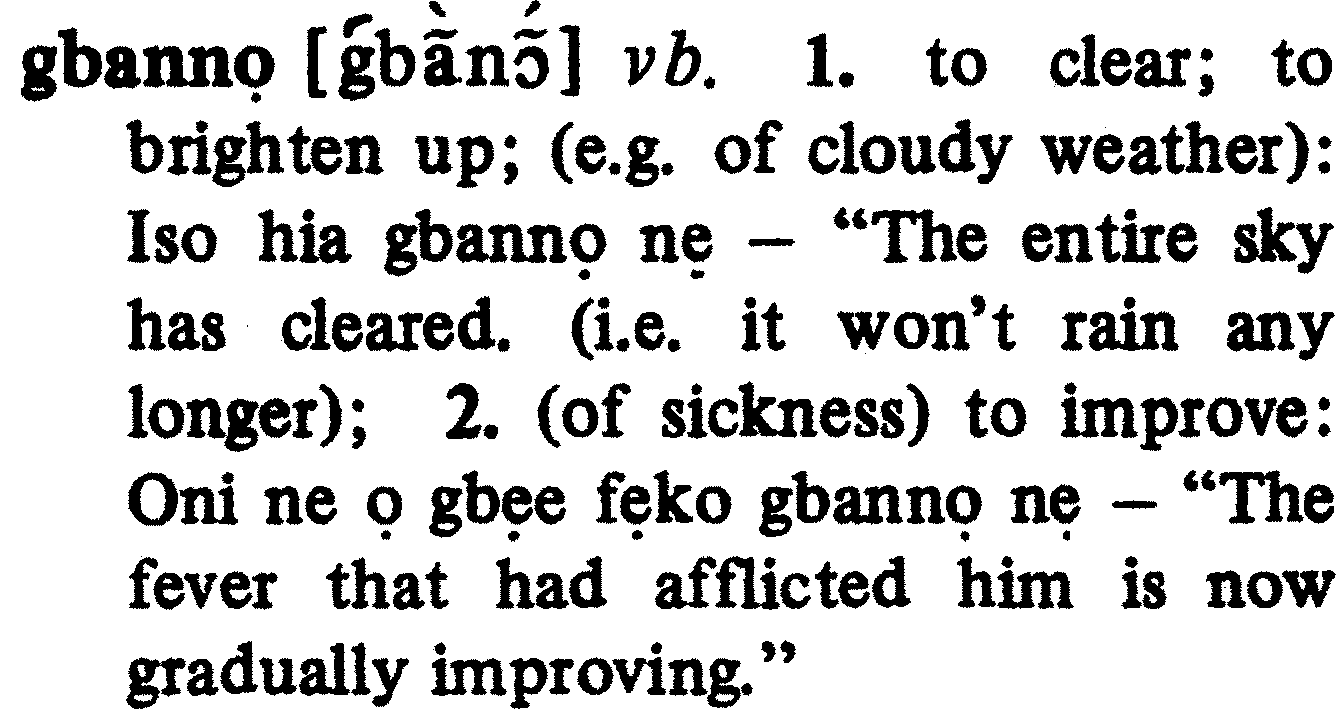
gbaroghee [g͡báɽòɣèé] vb. (< gbe2 ―
aro ― ghee): to take care of; to look
after: Rẹn ẹre ọ gbaroghe mwẹn vbe
asikito ― “He was the person who
looked after me in the hospital”.

gbasan [g͡básã́] vb. 1. (< gbe3 ― asan)
“to beat (with) cane”; to whip; to
cane; 2. (idiomatic); to urinate (of
male only).

gbe1 [g͡bé] vb. 1. to hatch: ọkhọkhọ
mwẹn gbe ihinrọn ― “My hen hatched
seven (chicks)”^; 2. to break (of day):
Ẹdẹ ma he gbe ― “The day has not
broken: It is not yet daybreak.”;
3. to force open (e.g. door) Urho-
iyekowa ẹre oyi gbe laọ owa ― “It
was the back door that the thief
forced open to get into the house.”;
4. (with ete olighi, etc.): to pre-
cipitate something; to cause; to bring
about: Ọ gbe olighi ye iran iko ―
“He caused a disruption in their
meeting.”
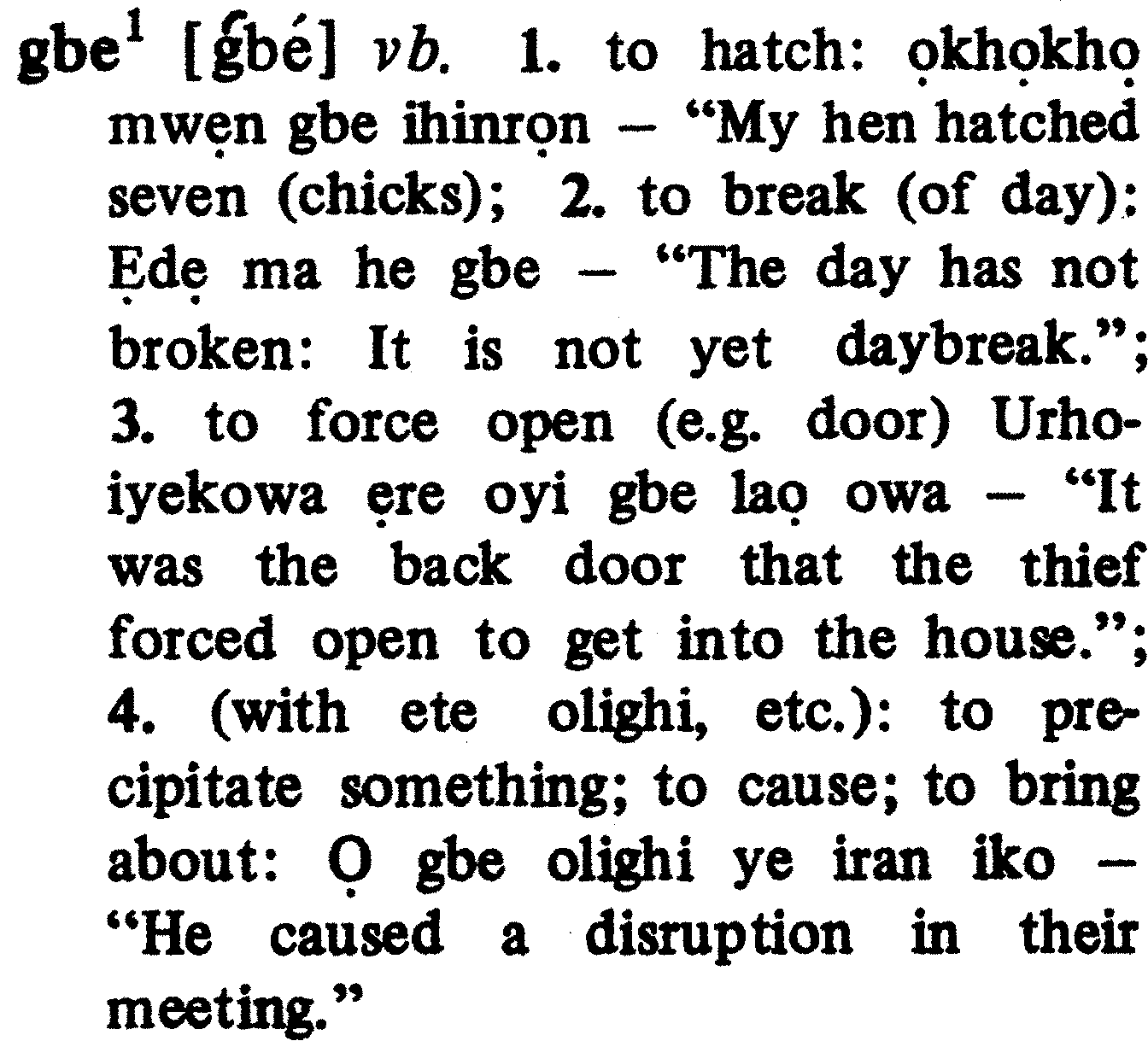
gbe2 [g͡bé] vb. 1. to dance: Iran gha
gbe ugho ― “They are dancing ugho
$Page 054$

dance”. 2. to move: ọ gha gbe yo
gbe re ― “It is moving back and
forth; i.e. it is not stable”.

gbe3 [g͡bé] vb. 1. to beat; flog: Iye
Ozo gbẹẹ ye emwin ne ọ mu-fua ―
“Ozo’s mother beat him on account
of the thing he lost”. 2. to catch
in a trap: Ọ ya ifi gbe uzo ― “He
caught an antelope with his trap.”
3. to kill; imọto gbe arhunmwenva
vbe odẹ Ẹdo ― “A car killed two
people along the Benin road.”
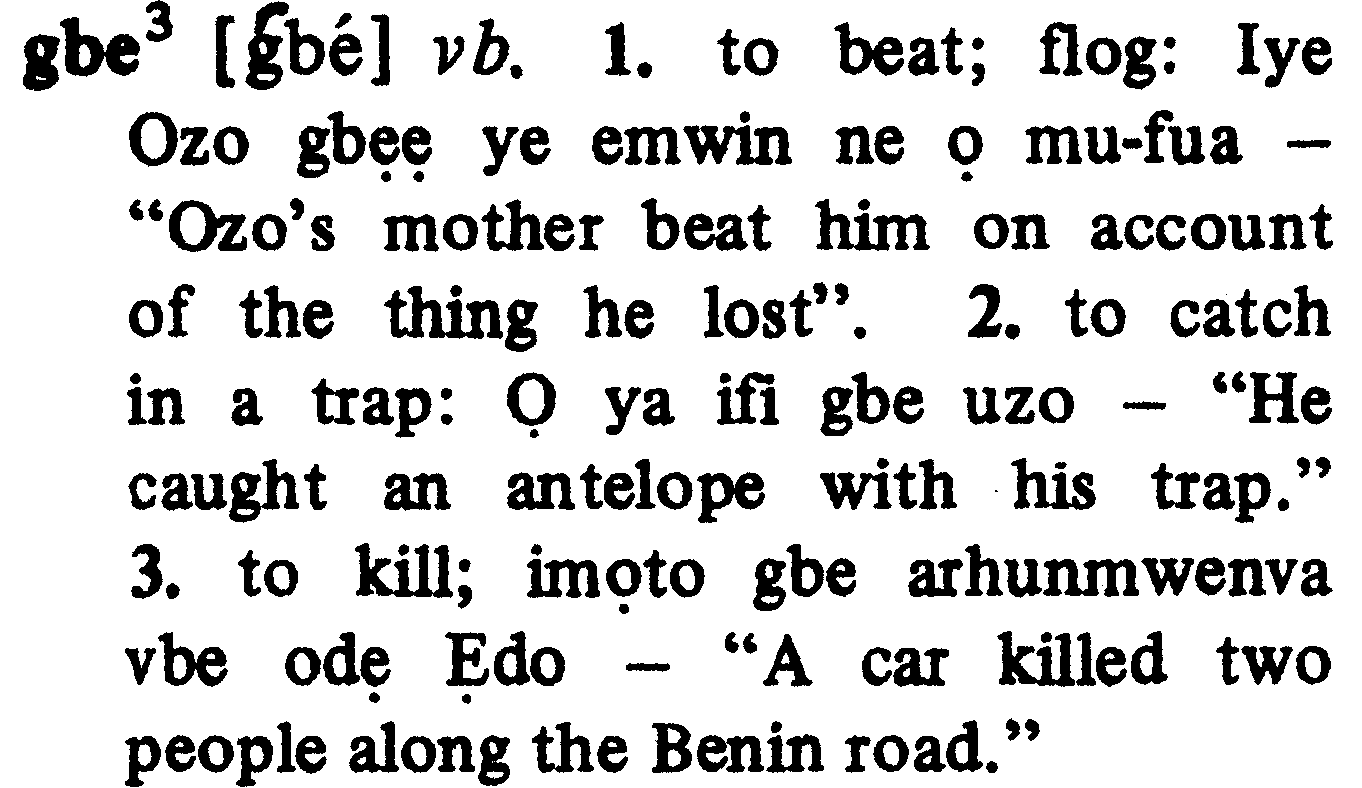
gbe4 [g͡bé] vb. to pick leaves of a
plant by hand: I khian ya gbe
ebuwọnmwẹn vbe iyekowa ― “I
am going to pick vegetables from
the back-yard.”

gbe5 [g͡bé] vb. to undertake; to do;
to make; to produce; gbugbo gbe ―
ugbo): “to do farm” ― to make a
farm, or to engage in farming.

gbe6 [g͡bé] vb. 1. (usually with liquids)
to pour, to spill: Ọ gbe amẹ ye otọ ―
“He poured water on the ground”;
2. to expose to; to come into contact
with: Ọ ya egbe gbe amẹ ― “He got
his body wet.” 3. to soil; to make
dirty: Ọ gbe ukpọn gbe ― “she wears
out cloth too readily.”
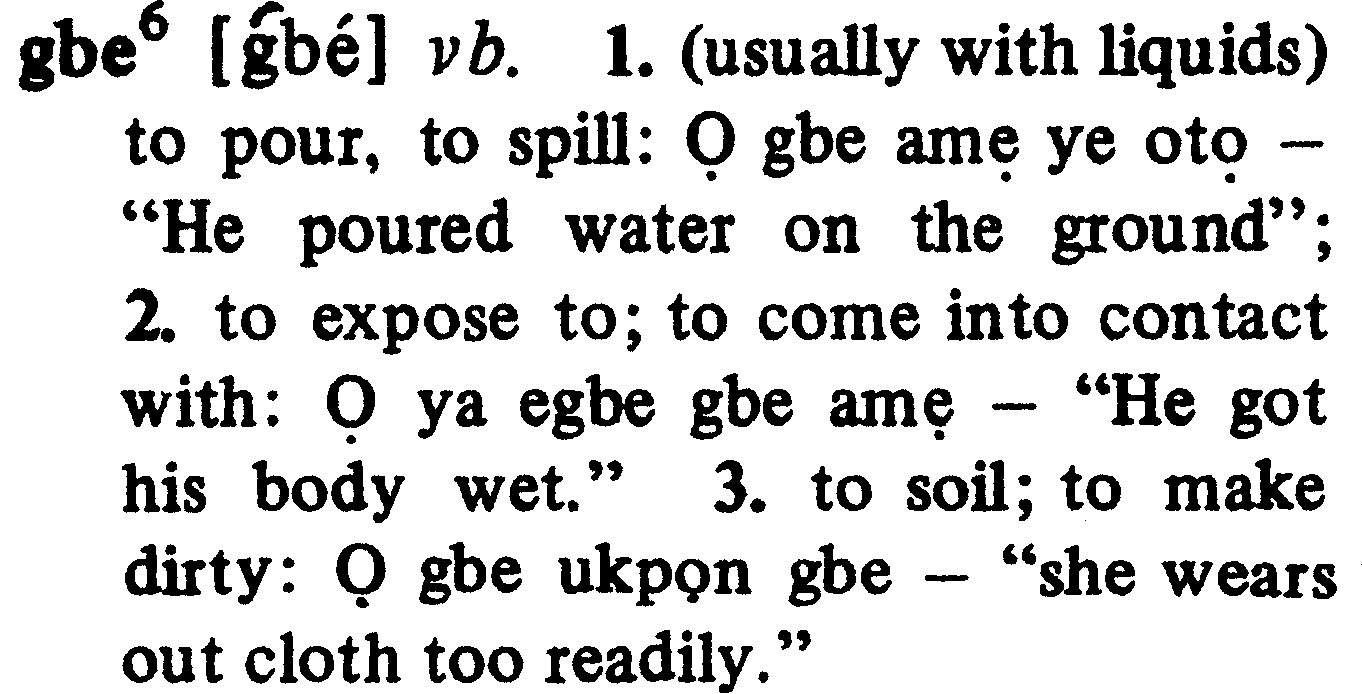
gbe7 [g͡bé] vb. to be forfeited; to be
gone for good: Igho hia ne o zẹ ye
ọvbokhan ren uhunmwun gbee ―
“All the money he had paid on his
wife’s head (i. e. as bride-price) is
forfeited.”
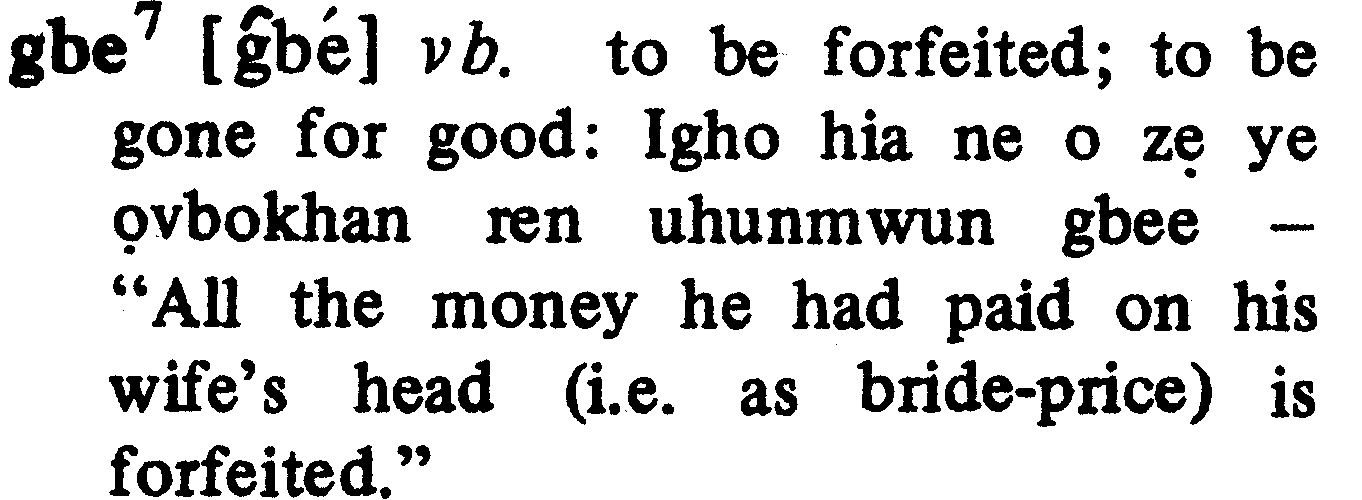
gbe8 [g͡bé] adv. 1. very well; very
much: ọ mose gbe ― “She is very
beautiful”; 2. excessively; too much.
Ọghuẹ bun gbe ― “Yours are too
plentiful i.e. Yours are more than
you should have.”
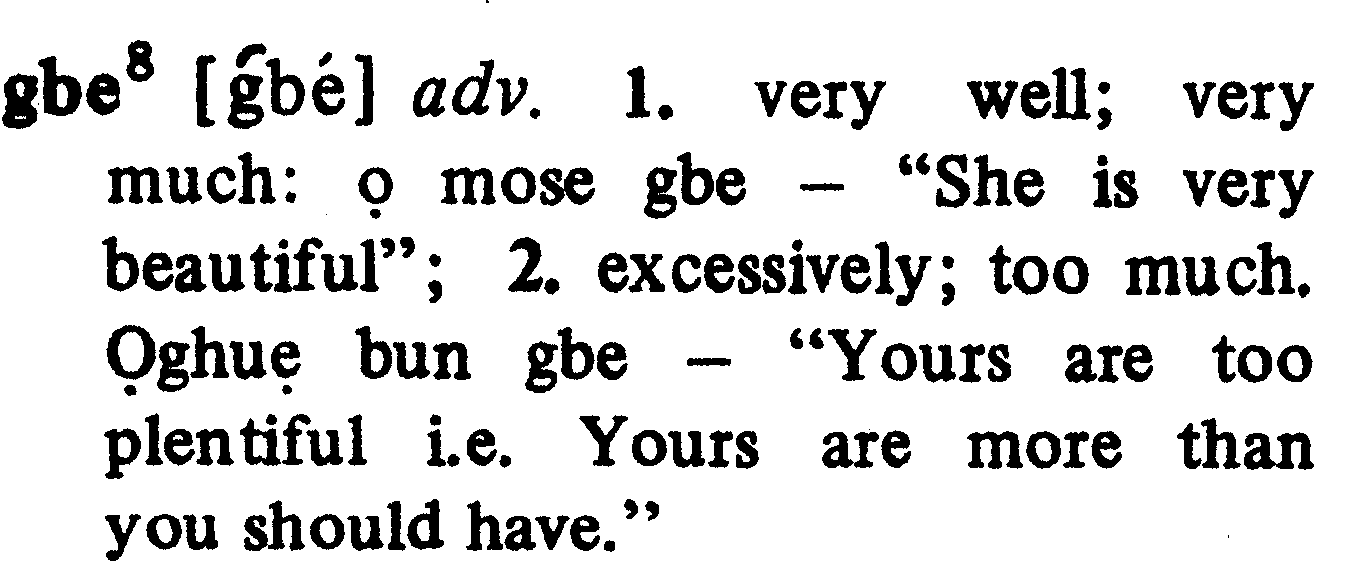
gbè [g͡bè] prep. against: Ọ mu uh-
%%

unmwun gbe ẹkhu ― “He hit his
head against the door.”

gbè-gué [g͡bègwèé] vb. to protect
one’s secrets or weakness; to cover
up for someone.

gbè-kaan [gbèkã́ɛ̃] vb. “to move and
touch”: to venture into contact with;
to cross somebody’s path (in an
adventurous sense): Ghẹ gbe-kaan
rẹn ighẹ ẹ i maa ― “Don’t cross his
path, for he is not good!”.
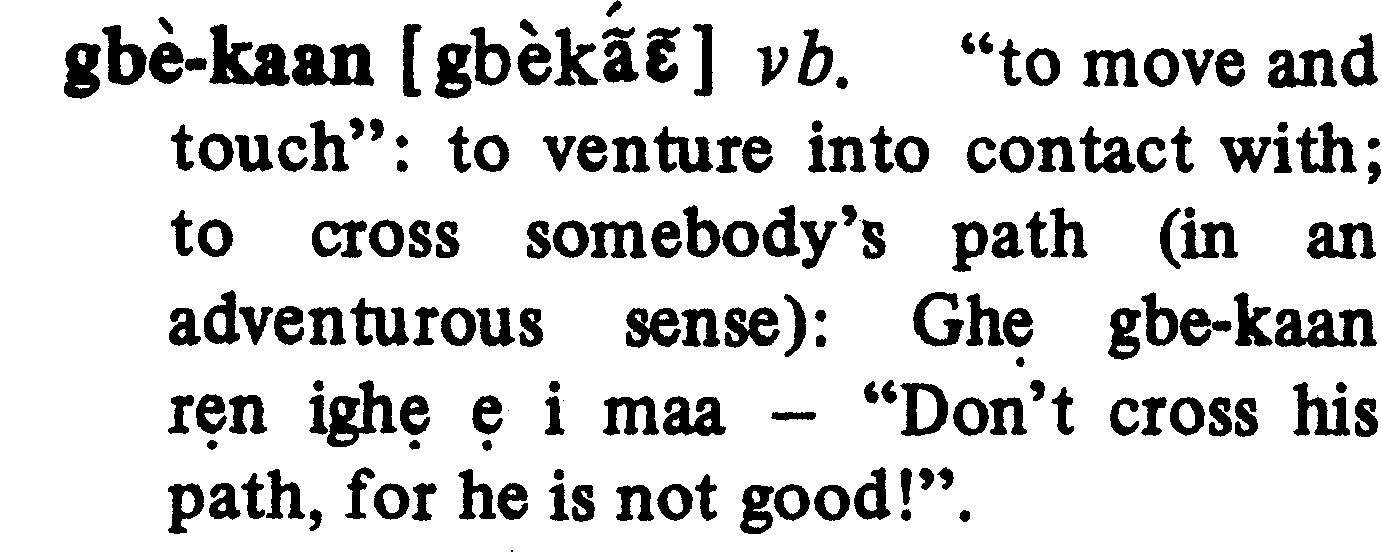
gbe-kue [g͡bèkweé] vb. “to break and
spill over”: to abuse vituperatively;
to revile a person. Okhuo nii ghi
gbe-kue Ozo nẹ, ekhue na ghi mu
ẹnrẹn ― “After that woman had
reviled Ozo, he became ashamed.”
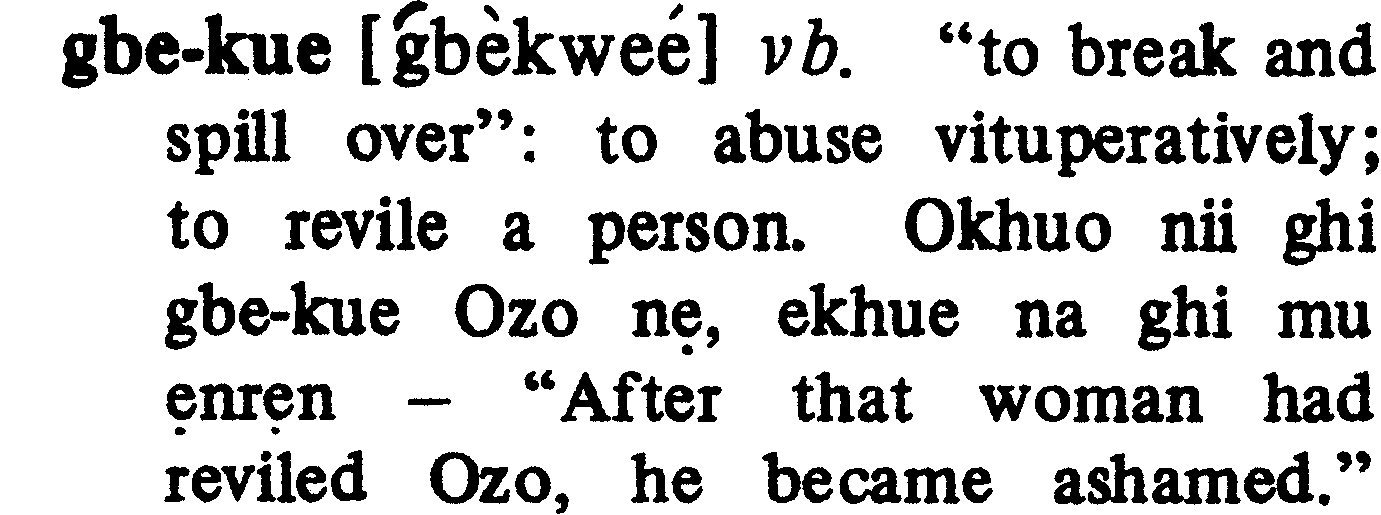
gbe-muotọ [g͡bèmwótɔ̀] vb. “to beat to
the ground” 1. to ruin completely;
to exhaust someone’s resources; 2.
to deface; to wreck.

gbe-rua [g͡bèɽuá] vb. “to beat to the
limit”: to kill. (also gbua).

gbee [g͡bèé] vb. 1. to slant: Owẹ
ọvbokhan na gbeere ― “This child’s
legs are slanted i.e. they are not
straight.” 2. Iran mu erhan
gbee odẹ ― “They placed a stick
across the road to block it.”
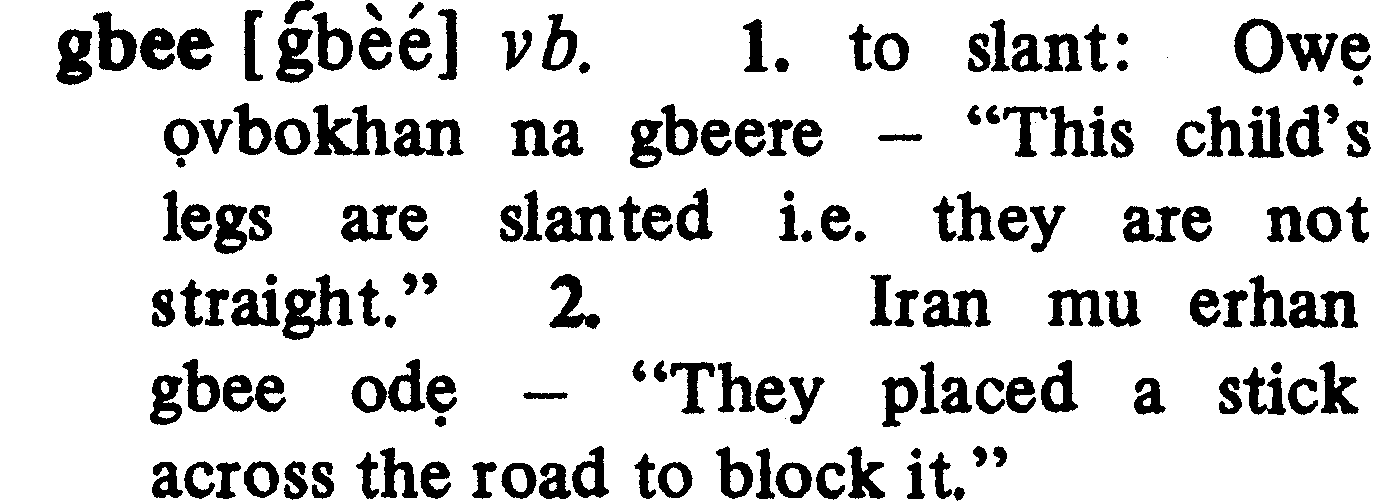
gbegbeegbe [g͡bég͡béég͡bé] adv. all
(without exception); totally: Iran
hia kpaa gbegbeegbe ― “They all
left totally.”

gbei [g͡beí] adv. usually occurs after a
clause or sentence to denote that the
action expressed by the verb in the
clause/sentence was performed in vain:
Vbene iran gualọ ọre sẹ, gbei, a ma
miọẹn ― “In spite of how hard they
looked for it, it was in vain; it was
not found.”
$Page 055$
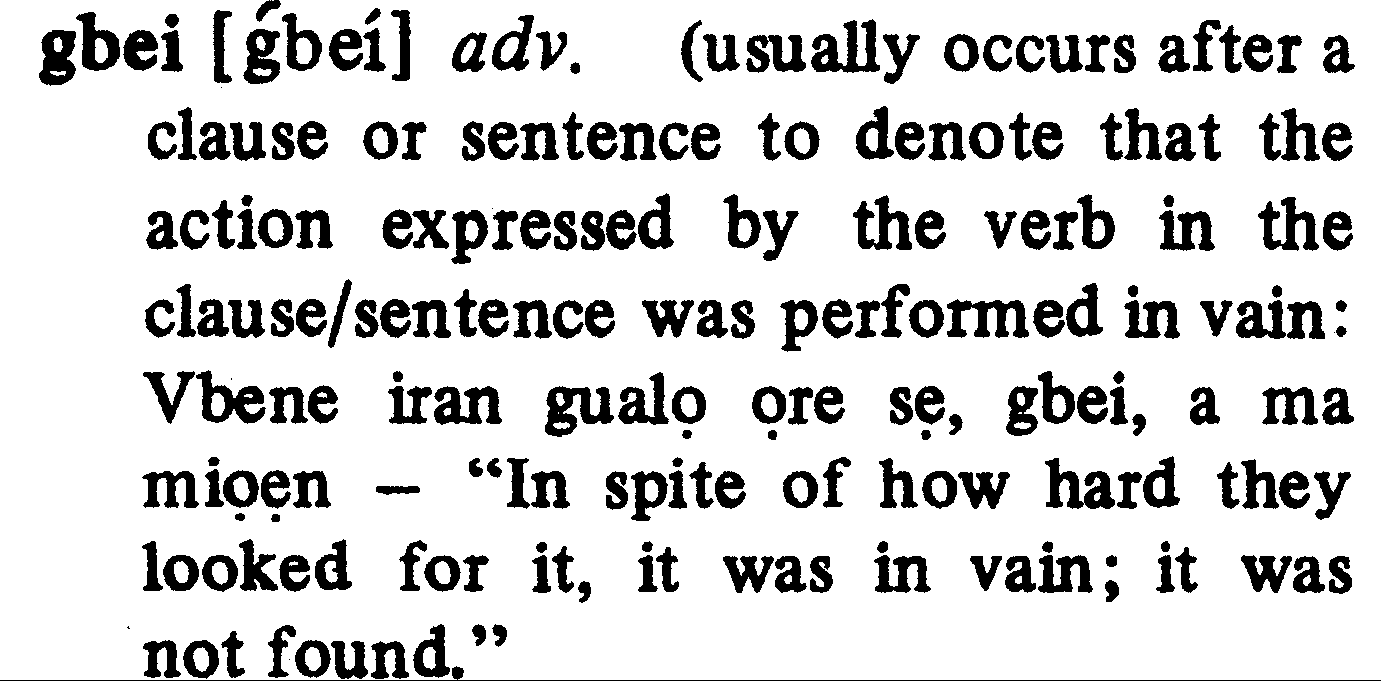
gbehẹn [g͡béhɛ̃̀] vb. (< gbe3 ― ehen)
“to catch fish”: to fish.

gbenbe [g͡bẽ̀bé] vb. (< gbẹn-ebe) “to
write book”: to write; to write a letter.

gbele [g͡bèlé] vb. pl. or reit. of gbe: Ọ
ya asan gbele iran ― “He flogged
them with a cane.”

gberraa [g͡bèràá] vb. to pass; to cross;
to go through.

gbẹbẹn [gbɛ́bɛ̃̀] vb. (< gbe2-ebẹn) “to
dance (with) ẹbẹn”: to toss ẹbẹn in
the ceremonial dance performed by
chiefs while paying their respects
to the Ọba.

gbẹhun [g͡bɛ̀hṹ] vb. (< gbe ― ẹhun)
“to break into a decayed state”: to
decay from insect contamination.

gbẹmwẹnho [g͡bɛ̀ɱɛ̃̀hó] vb. (< gbe-
ẹmwẹn-ẹho): to spell out the mean-
ing of a word in direct terms; to
speak in direct, rather than idiomatic
language.

gbẹn1 [g͡bɛ̃́] vb. to write; to carve; to
mark.

gbẹn2 [g͡bɛ̃́] vb. to deflesh a piece of
meat; to chew around bone.

gbẹn3 [g͡bɛ̃́] vb. to clear off grass from
a plot: gbẹn irunmwun ― “cut grass”.

gbẹngbẹn [g͡bɛ̃̀gbɛ̃́] vb. 1. intensive
sense of gbẹn2; 2. to narrate in great
detail, especially in secret: Emwin
hia ne iran ru ẹre vbe iyẹe i rre owa,
ọ na doo gbẹngbẹn ehia ma iyẹe ―
“All the things that they had done
to her when her mother was away
from home, she then narrated it all
in great detail to her mother”.
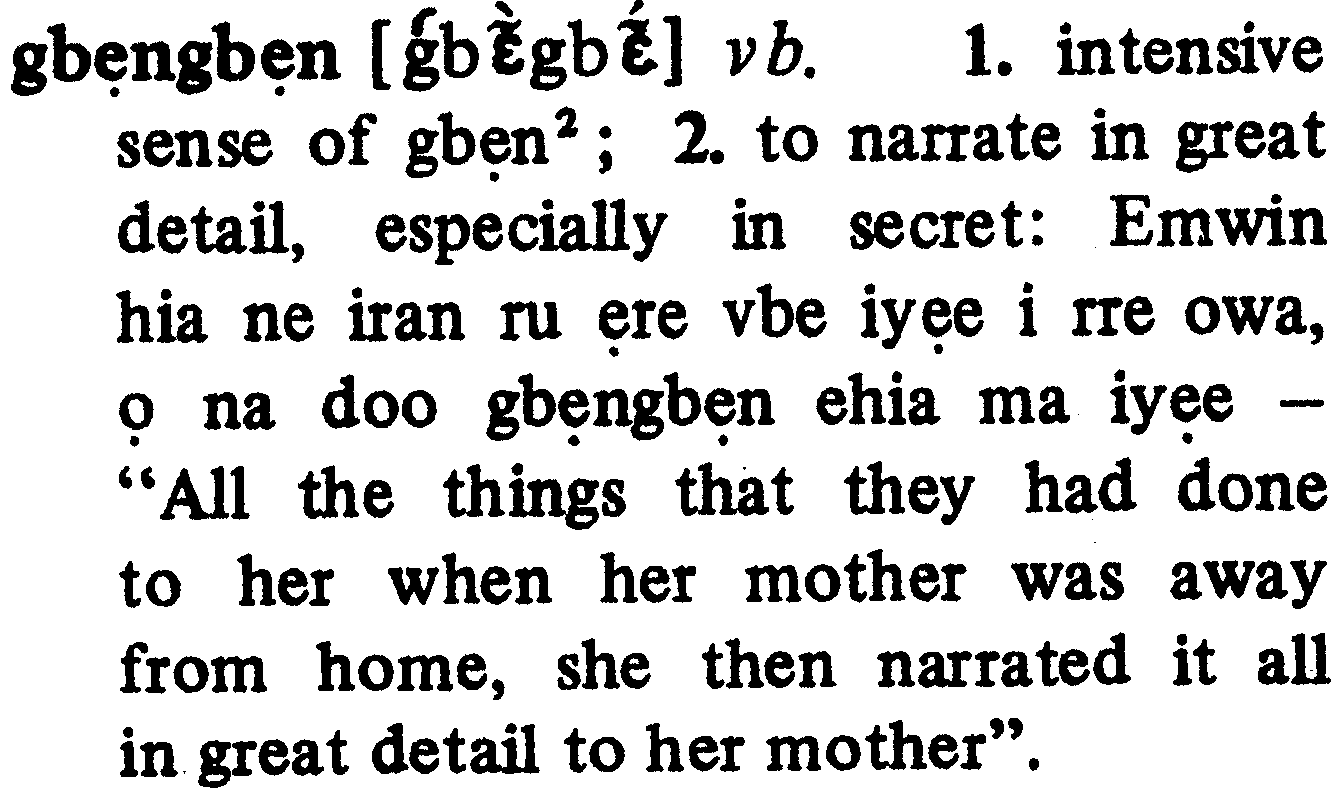
gbẹnnẹ [gbɛ̃̀nɛ̃́] vb. pl. and reit. sense
%%

of gben1: Ọ gbẹnnẹ emwin ye aro ―
“She has marks on her face.”

gbẹro [g͡bɛ́ɽó] vb. to be exterminated.
U gha gbẹro ― “May you become
exterminated”. (a common curse).

gbẹtẹ [g͡bɛ́tɛ̀] vb. (< gbe ― ẹtẹ): to
have an ulcer or a sore (usually on a
leg or foot).

gbẹu [g͡bɛ̀u] adv. describes a sudden
and hard fall.

gbidii [g͡bídíí] adv. with the verb
(hunwan): mute; without uttering a
sound. I tuẹ ọre: ọ hunwan gbidii ―
“I greeted him; he remained dead
silent.”

gbìdii [g͡bìdìì] adv. describes the sound
of something heavy, such as a tree
falling into water.

gbigiawẹ [g͡bìgyáwɛ̀] vb. (< gbe2 ―
igiawẹ) to move with loud steps:
to stamp around; to step firmly and
loudly.

gbigunma [g͡bìgṹmã̀] vb. (< gbe5 ―
iguma) to grunt (e.g. with pain or
fatigue).

gbigbi [g͡bìg͡bí] vb. to spread like the
wind: Iyẹn nii gbigbi se ehe hia nẹ ―
That news has spread everywhere
(like the wind).

gbigbigbi [g͡bìg͡bìg͡bì] adv. describes 1.
the sound of a forceful knock on
the door; 2. the movement of a
strong wind or storm.

gbigbo [g͡bíg͡bò] vb. (< gbe3 ― igbo)
“to hit a top”^: to play the game of
igbo (in which a top is spinned in
sand, by means of a piece of string
tied to a stick).
$Page 056$

gbii [g͡bíí] adj.; adv. (with ye) nu-
merous; very many.

gbighidi [g͡bìɣìdì] adv. describes the
falling of a big and heavy object.

gbikhiavbọ [g͡bíxyavɔ̀] vb. (< gbe3 ―
ikhiavbọ) to beat okro in a wooden
mortar with a pestle (the traditional
method of preparing okro for use
in soup.)

gbinna1 [g͡bĩ̀nã́] vb. to fight.

gbinna2 [gbĩ̀nã́] vb. to seek the pro-
tection of somebody (from an
adversary).

gbinrunmwun [g͡bĩ́ɽũ̀ɱũ̀] vb. (< gbẹn
― irunmwun): to clear grass.

gbirhu1 [g͡bìřú] vb. (< gbe5 ― irhu)
to make a roost (of a bird) to sit
on eggs; to brood.

gbirhu2 [g͡bìřṹ] vb. (< gbe5 ― irhu)
“to make a shade” to cast a shade.

gbirro [g͡bírò] vb. (< gbe ― irro):
to pose a riddle.

gbiyarre [g͡bìyárè] vb. (< gbe-iyare)
“to shout ‘Iyare’”: to wish well
somebody who is embarking on a
challenging enterprise by uttering
“Iyare” (May you go and come);
to wish safe return from the per-
formance of a feat.
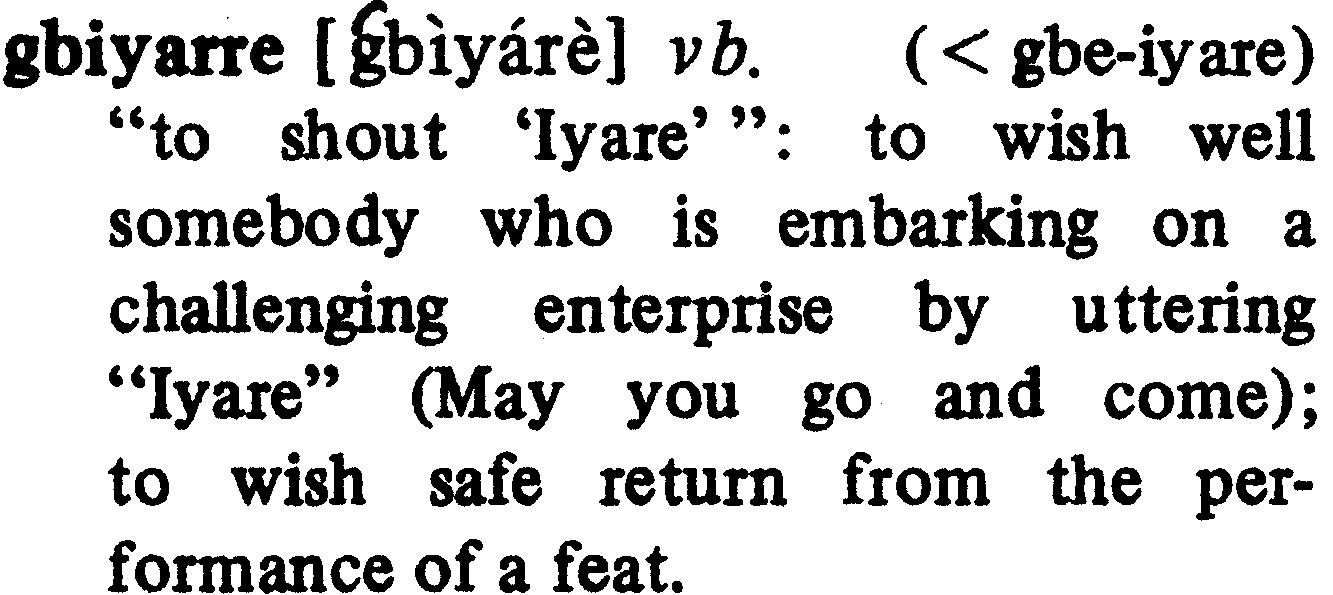
gboba [g͡bóbà] vb. (< gbe ― oba): to
be dented; to cave in.

gbobodo [g͡bóbóòdò] vb. (< gbe ―
obodo): “to dance obodo”: to
pirouette; to spring and spin round
and round on one foot.

gbodan [g͡bódã́] vb. (< gbe ― odan):
to interrupt; to obstruct.
%%

gbodoo [g͡bódóó] adj.; adv. very
wide, broad (also gbodoo [ ` ``][gbòdòò];
gboo).

gbogiẹ [g͡bògyɛ́] vb. (< gbe ― ogié)
laugh at; to make fun of.

gbohio [g͡bòhyó] vb. (< gbe ― ohio):
to cave in; (of ground): to give way.

gbokoo [g͡bókóó] adj. (used with ye)
well-built; (of human beings); tall
and stout.

gbokhokho [g͡bóxoxò] vb. (< gbe3 ―
okhokho): to hit on the head with
the knuckles.

gbokhokheve [g͡bòxóxèvé] vb. (<
gbe1 ― okhokho-evẹ): to burst into
tears; gbokhokhogie: “to burst into
laughter”.

gboo [g͡bóó] adj. cf. gbodoo.

gbotọ1 [g͡bótɔ̀] vb. (< gbe3 ― otọ):
to wear routinely; to wear everyday.

gbotọ2 [g͡bótɔ̀] adv. (< gbe ― otọ):
against the ground; down: Ọ de gbotọ:
“It fell down”; “it dropped”.

gbọfọ [g͡bɔfɔ] vb. (< gbe ― ọfọ): to
break out (with) sweat: to become
damp; to be wet.

gbọhun [g͡bɔ́hṹṹ] adj.; adv. of hu-
man beings: to be tall and stout (e.g.
an over-grown child).

gbọọ [g͡bɔ̀ɔ́] vb. to bark (of a dog).

gbọọ [g͡bɔ̀ɔ́] vb. to plant seedlings or
cuttings: Ọ gbọọ iyan ― “He planted
yam seedlings.”

gbọọọ [g͡bɔ̀ɔ̀ɔ̀] adv. staring foolishly;
looking agape.
$Page 057$

gbọrho [g͡bɔ́řɔ̀] vb. (< gbe1 ― ọrho):
“to hit mud”: 1. to be muddy, to
get into mud; 2. to move around in
the mud.

gbọtọn [g͡bɔ́tɔ̃̀] vb. (< gbe1 ― ọtọn)
to break out with rust: to become
rusty.

gbọvo [g͡bɔ̀vó] vb. (< gbe5 ― ọvo―)^:
to begrudge; to resent.

gbua [g͡bùá] vb. (see gbe-rua).

gbubi [g͡búbì] vb. (< gbe3 ― ubi):
to slap (somebody).

gbugbo [gbúgbó] vb. (< gbe5 ― ugbo)
%%

“to make farm”: to farm.

gbuke [g͡búkè] vb. (< gbe2 ― uke):
“to dance uke dance”: to dance with
joy by stamping around to a beat.

gbukegbuke [g͡búkég͡búké] adv. de-
scribes a revolting smell: Ọ wia
gbukegbuke ― It smells very badly.

gbukpukpẹ [g͡búk͡púk͡pɛ̀] vb. (< gbe2
― ukpukpe) 1. to dance “ukpukpe”
dance; 2. to trek back and forth
anxiously.

gbuu [g͡bùù] adv. describes a bad
smell; (e.g. of fermented cassava.).
